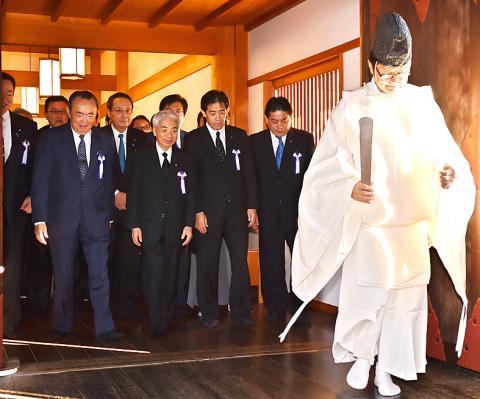Japanese Prime Minister Shinzo Abe sent a ritual offering to Tokyo’s Yasukuni Shrine yesterday, prompting sharp rebukes from China and South Korea, even as Abe seeks meetings with their leaders to improve strained ties.
The shrine, which honors 30,304 Taiwanese who died in World War II among 2.5 million other war dead, is seen by critics such as China and South Korea as a symbol of Japan’s past militarism, because it honors wartime leaders convicted by an Allied tribunal as war criminals, along with millions of war dead.
A group of Japanese lawmakers paid their respects at the shrine yesterday, the beginning of an autumn festival, while Abe sent a small masakaki tree, witnesses said.

Photo: AFP
There was no sign of Cabinet ministers, although NHK public television said Japanese Minister of Health Yasuhisa Shiozaki sent an offering. A ruling party lawmaker tweeted that three ministers planned to visit today.
China expressed “serious concern” after Abe’s offering.
“China reiterates that only by Japan earnestly and squarely facing, deeply reflecting upon its history of invasion and clearly distancing itself from militarism, can China-Japan relations realize healthy and stable development,” Chinese Ministry of Foreign Affairs spokesman Hong Lei (洪磊) said in a statement.
South Korea said it deplored Abe’s offering to the shrine, which it called “the symbol of glorification of Japan’s colonization and invasive war.”
“Japan should move forward to a bright future based on serious reflection on the past, not locking itself in the dark past,” a South Korean Ministry of Foreign Affairs spokesman said.
Expectations have been growing that Abe will be able to meet Xi for icebreaking talks next month at an APEC summit in Beijing.

US President Donald Trump yesterday announced sweeping "reciprocal tariffs" on US trading partners, including a 32 percent tax on goods from Taiwan that is set to take effect on Wednesday. At a Rose Garden event, Trump declared a 10 percent baseline tax on imports from all countries, with the White House saying it would take effect on Saturday. Countries with larger trade surpluses with the US would face higher duties beginning on Wednesday, including Taiwan (32 percent), China (34 percent), Japan (24 percent), South Korea (25 percent), Vietnam (46 percent) and Thailand (36 percent). Canada and Mexico, the two largest US trading

AIR SUPPORT: The Ministry of National Defense thanked the US for the delivery, adding that it was an indicator of the White House’s commitment to the Taiwan Relations Act Deputy Minister of National Defense Po Horng-huei (柏鴻輝) and Representative to the US Alexander Yui on Friday attended a delivery ceremony for the first of Taiwan’s long-awaited 66 F-16C/D Block 70 jets at a Lockheed Martin Corp factory in Greenville, South Carolina. “We are so proud to be the global home of the F-16 and to support Taiwan’s air defense capabilities,” US Representative William Timmons wrote on X, alongside a photograph of Taiwanese and US officials at the event. The F-16C/D Block 70 jets Taiwan ordered have the same capabilities as aircraft that had been upgraded to F-16Vs. The batch of Lockheed Martin

China's military today said it began joint army, navy and rocket force exercises around Taiwan to "serve as a stern warning and powerful deterrent against Taiwanese independence," calling President William Lai (賴清德) a "parasite." The exercises come after Lai called Beijing a "foreign hostile force" last month. More than 10 Chinese military ships approached close to Taiwan's 24 nautical mile (44.4km) contiguous zone this morning and Taiwan sent its own warships to respond, two senior Taiwanese officials said. Taiwan has not yet detected any live fire by the Chinese military so far, one of the officials said. The drills took place after US Secretary

THUGGISH BEHAVIOR: Encouraging people to report independence supporters is another intimidation tactic that threatens cross-strait peace, the state department said China setting up an online system for reporting “Taiwanese independence” advocates is an “irresponsible and reprehensible” act, a US government spokesperson said on Friday. “China’s call for private individuals to report on alleged ‘persecution or suppression’ by supposed ‘Taiwan independence henchmen and accomplices’ is irresponsible and reprehensible,” an unnamed US Department of State spokesperson told the Central News Agency in an e-mail. The move is part of Beijing’s “intimidation campaign” against Taiwan and its supporters, and is “threatening free speech around the world, destabilizing the Indo-Pacific region, and deliberately eroding the cross-strait status quo,” the spokesperson said. The Chinese Communist Party’s “threats